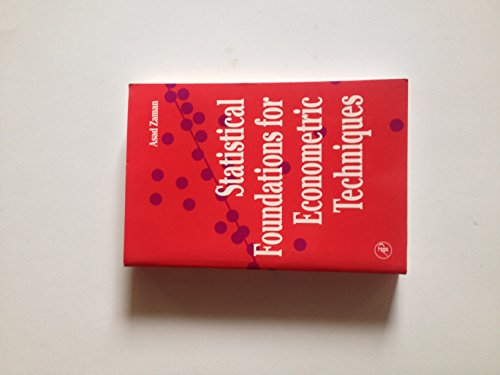Synopsis:
"Statistical Foundations for Econometric Techniques" features previously unavailable material in a textbook format for econometrics students, researchers, and practitioners. Taking strong positions for and against standard econometric techniques, the book endorses a single best technique whenever possible. In many cases, the recommended optimal technique differs substantially from current practice. Detailed discussions present many new estimation strategies superior to conventional OLS and ways to use them. It evaluates econometric techniques and the procedures commonly used to analyze those techniques. It challenges established concepts. It introduces many techniques that are not available in other texts. It recommends against using the Durbin-Watson and Lagrange Multiplier tests in favor of tests with superior power. It provides many new types of estimation strategies superior to conventional OLS. It forms a judicious mixture of various methodological approaches. It illustrates Empirical Bayes estimators and robust regression techniques possessing a 50 per cent breakdown value.
Review:
Zaman...succeeds in asserting the link between classical statistics and econometrics[. H]is book should be of great interest to both teachers of core econometrics graduate courses as well as to practitioners of the art of econometrics...One of the most useful features of the book is that all of the techniques discussed are critiqued very carefully, with great emphasis on historical development, ease of implementation in practice, and realism of assumptions. The book also addresses with great insight the tensions between Bayesian and classical econometrics...Overall, the book is unique in two ways. First, there is emphasis not only on theoretical detail, but also on intuitive appeal. Second, the book brings together a very wide variety of different techniques and statistical approaches to econometrics, and does so in a rather unifying fashion...[I]t is a must for the bookshelf of the practicing econometrics, as important areas such as the bootstrap, higher order asymptotics,Edgeworth expansions, empirical Bayes, and the Gibbs sampler are elucidated very clearly.
--ECONOMETRIC REVIEWS
Asad Zaman's treatment of theoretical econometrics from the viewpoint of mathematical statistics provides highly informative insight for economists who want to develop the subject in a way that builds on their own economic analyses. In this way, he hastaken econometrics back to its most fruitful origins, where measurement was guided by economic theory rather than open empiricism. He combines the probability structure on which statistical inference is based with the formal theory of economics in order to draw conclusions from observed data.
--LAWRENCE R. KLEIN, University of Pennsylvania, Nobel Laureate in Economics
Zaman beautifully unifies a wide assortment of topics in cutting-edge statistics and econometrics, ranging from advanced testing and estimation theory (including bootstrap) to empirical Bayes, minimax, and robust procedures. Zamans is unique among booksat this level in its insightful coverage of topics non-standard among econometricians, its quick-paced readability, and its simultaneous concern with both foundational and practical issues in the advancement of knowledge.
--FRANCIS X. DIEBOLD, University of Pennsylvania
This unique text...is statistically well-informed and in tune with the needs of modern econometrics. The discussion on texts and optimal inference is superb. The Bayesian and Frequentist viewpoints are seamlessly integrated. A must read for graduates and professionals alike.
--ESFANDIAR MAASOUMI, Southern Methodist University
I enjoyed reading the book, and it will be a good book as a source of reference.
--SHORT BOOK REVIEWS
"About this title" may belong to another edition of this title.
![]()
